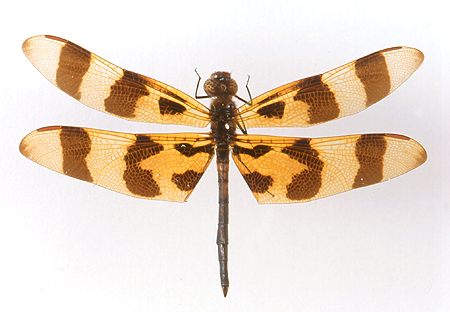
Odonata - The Dragonflies and Damselflies
Odonata is the order that contains the dragonflies and damselflies. First appearing in the Carboniferous period some 350-280 million years ago, the Odonates represent some of the most ancient insect forms. Fossil dragonflies dating from the subsequent Permian period (225 million years ago) are almost identical to modern forms. All Odonates are predatory throughout their entire life cycles (the name "Odonata" means "toothed-ones" in Latin). Dragonflies and damselflies are different in structure but similar in general habits. Damselflies have wings that are more teardrop-shaped than those of dragonflies and heads that are more barbell-shaped, with eyes comparatively smaller than those of dragonflies. They are weaker fliers and seem to flutter, a sharp contrast to the agile dragonflies who, with their strong wings and large heads (comprised mainly of two huge eyes), are masters of the sky. Superb fliers, dragonflies are incredibly skilled aerialists and can hover, fly backwards and perform maneuvers so fast that they are difficult to even follow. It is in the air that they hunt and in the air that mating often takes place. The females then deposit fertilized eggs in bodies of water (sometimes on or in plants) where they soon hatch into solitary larvae. All dragonflies and damselflies have an aquatic stage; a wingless, predatory larva called a naiad. When the last larval instar is reached, full-grown naiads climb up out of their aquatic homes and shed their larval skins to emerge as winged adults. Adults spend most of the day on the wing and rest at night. Until birds evolved, dragonflies ruled the air. This ancient lineage, their bright colors and the magnificence of their aerial abilities make them one of the most admired of all the insects. In closing, it is worth noting that some people fear dragonflies. Let it be known: DRAGONFLIES CANNOT STING!! They will not bite you, attack you or sew your mouth shut if you lie or swear. The name “Darning Needle” is simply an archaic namesake that still survives to this day. It is based on the myth that Odonates are in league with the Devil, which is quite silly really. At any rate, they have accrued well over a hundred other slanderous names, including adderbolt, water witch and goblin-fly. In Australia, they are still called “Horse-stingers”. There are about 6,000 described species of Odonates.
Anisoptera - The Dragonflies
 Green Darner Dragonfly AKA The Mosquito Hawk (Anax junius)
Green Darner Dragonfly AKA The Mosquito Hawk (Anax junius)
 Elisa Skimmer A.K.A. Calico Pennant Dragonfly (Celithemis elisa)
Elisa Skimmer A.K.A. Calico Pennant Dragonfly (Celithemis elisa)
 Green Clearwing A.K.A. Eastern Pondhawk Dragonflies (Erythemis simplicicollis)
Green Clearwing A.K.A. Eastern Pondhawk Dragonflies (Erythemis simplicicollis)
 Slaty Skimmer Dragonfly (Libellula incesta)
Slaty Skimmer Dragonfly (Libellula incesta)
 Widow Skimmer Dragonflies (Libellula luctuosa)
Widow Skimmer Dragonflies (Libellula luctuosa)
 Great Blue Skimmer Dragonfly (Libellula vibrans)
Great Blue Skimmer Dragonfly (Libellula vibrans)
 Blue Dasher A.K.A. Swift Long Winged Skimmer Dragonfly (Pachydiplax longipennis)
Blue Dasher A.K.A. Swift Long Winged Skimmer Dragonfly (Pachydiplax longipennis)
 Wandering Glider AKA Globetrotter Dragonfly (Pantala flavescens)
Wandering Glider AKA Globetrotter Dragonfly (Pantala flavescens)
![]() Eastern Amberwing Dragonflies (Perithemis tenera)
Eastern Amberwing Dragonflies (Perithemis tenera)
 Common Whitetail Dragonflies (Plathemis lydia)
Common Whitetail Dragonflies (Plathemis lydia)
 Jagged-Edged Saddlebag Dragonfly (Tramea lacerata)
Jagged-Edged Saddlebag Dragonfly (Tramea lacerata)
 Dragonfly Larvae (Various spp.)
Dragonfly Larvae (Various spp.)
Zygoptera - The Damselflies
![]() Black-Winged Damselflies (Calopteryx maculata)
Black-Winged Damselflies (Calopteryx maculata)
 Helicopter Damselfly (Mecistogaster lucretia)
Helicopter Damselfly (Mecistogaster lucretia)
 Helicopter Damselfly (Megaloprepus caerulatus)
Helicopter Damselfly (Megaloprepus caerulatus)
 Helicopter Damselfly (Microstigma rotundata)
Helicopter Damselfly (Microstigma rotundata)

